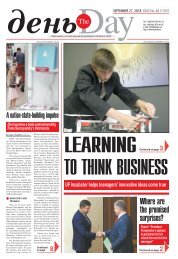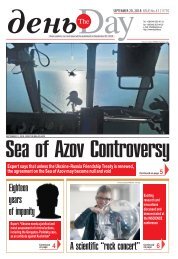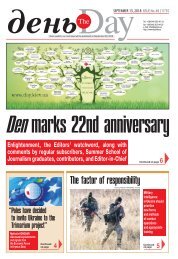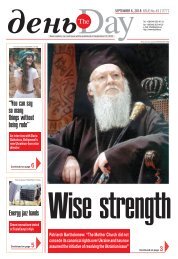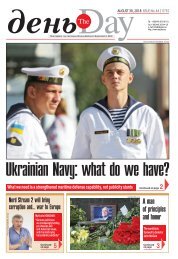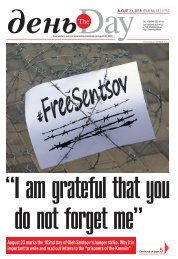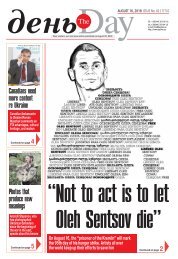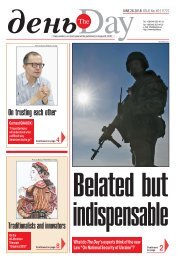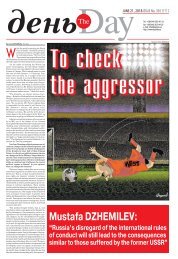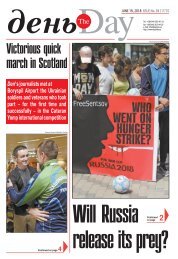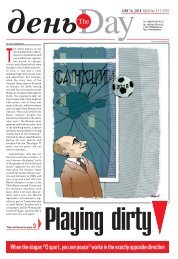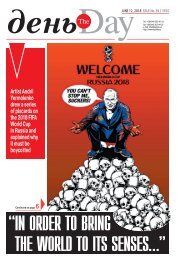41_1-8
You also want an ePaper? Increase the reach of your titles
YUMPU automatically turns print PDFs into web optimized ePapers that Google loves.
2<br />
No.<strong>41</strong> AUGUST 9, 2018<br />
DAY AFTER DAY<br />
WWW.DAY.KIEV.UA<br />
By Solomiia NYKOLAIEVYCH, Den’s<br />
Summer School of Journalism, 2018<br />
Has the old conflict between the<br />
two neighboring countries been<br />
finally settled? Does a common<br />
problem help unite the parties<br />
concerned? These and other<br />
questions were posed to Polish Ambassador<br />
Jan Pieklo by young journalists of Den’s<br />
Summer School of Journalism. “Poland is<br />
criticizing Russia for its aggression in the<br />
east of Ukraine and for the annexation of<br />
Crimea,” said Mr. Pieklo. He went on to<br />
assure those present that Poland and<br />
Ukraine would “continue to cooperate” and<br />
help each other. He noted that the Polish<br />
government is already trying to slow down<br />
the launch of the construction of Nord<br />
Stream 2. This gas pipeline is apparently<br />
not as important for Poland as it is for<br />
Donald Trump the businessman. Mr. Pieklo<br />
said that Poland and Ukraine share their<br />
national heritage which is enormous,<br />
invaluable, and indivisible on a world and<br />
local scope. The Polish diplomat stressed<br />
that Poles must stand shoulder to shoulder<br />
with Ukrainians in building a joint nonstereotyped<br />
future.<br />
● EU APPROVES OF UKRAINE’S<br />
REFORMS<br />
Solomiia NYKOLAIEVYCH, Lesia<br />
Ukrainka Eastern European National<br />
University: “How would you briefly describe<br />
the Polish view on the recent EU-<br />
Ukraine and NATO summits, particularly<br />
the meeting between Vladimir Putin<br />
and Donald Trump?”<br />
“Remarkably, three such events took<br />
place within one week. This wasn’t planned<br />
that way, but just happened. I think the<br />
EU-Ukraine summit in Brussels had an effect<br />
on the NATO summit that was attended<br />
by your president and his Georgian<br />
counterpart. The meeting between<br />
Vladimir Putin and Donald Trump was interesting,<br />
considering that it lasted for<br />
about two hours and that we know nothing<br />
about what happened in Helsinki then.<br />
Both presidents were accompanied by interpreters<br />
and no one else. No one knows<br />
what they spoke about. There was a news<br />
conference after their meeting. Putin<br />
said a few words about Ukraine and noted<br />
that Donald Trump doesn’t recognize<br />
the annexation of Crimea. The US president<br />
didn’t mention Ukraine at all, and nor<br />
did he mention what was happening in that<br />
European country. As for the EU-Ukraine<br />
summit, preparations were made and<br />
everyone knew what would happen. President<br />
Petro Poroshenko wanted Ukraine to<br />
be part of EU activities and the EU and<br />
Ukraine to come out jointly against Project<br />
Nord Stream 2. This didn’t happen.<br />
The Ukrainian president also wanted to<br />
discuss Schengen [visas], but it was impossible.<br />
Instead, the EU approved of<br />
Ukraine’s progress in making reforms,<br />
particularly in regard to the Anticorruption<br />
Court, as required by the IMF to issue<br />
the next tranche. In other words,<br />
that summit passed without surprises. At<br />
the NATO summit, Hungary blocked the<br />
meeting of the Ukraine-NATO Commission.<br />
The Georgia-Ukraine Black Sea format<br />
was adopted instead. Of course, this<br />
wasn’t what Ukraine and some NATO<br />
countries wanted, but the important fact<br />
was the presence at the summit of the<br />
Ukrainian and Georgian presidents. Getting<br />
back to the meeting between Putin<br />
and Trump, one wonders about the choice<br />
of Helsinki as the site, considering that<br />
the Final Act [of the Conference on Security<br />
and Cooperation in Europe] was<br />
signed there, providing for the inviolability<br />
of frontiers. Symbolically, the two<br />
presidents met in Helsinki after Putin had<br />
breached all of Russia’s agreements on<br />
this inviolability. However, their meeting<br />
was very important. It meant that Russia<br />
wants to take part in global politics. We<br />
don’t know what decisions were made<br />
then, but we’ll learn soon enough. Some<br />
believe that a decision was made that<br />
would be bad for Ukraine and negative for<br />
Poland and Europe. Still, we don’t know<br />
what decisions were made. Your colleagues,<br />
US journalists, ranging from<br />
Conservative to Republican, were very<br />
critical about that meeting and the press<br />
conference. That conference was the only<br />
chance to learn something about what<br />
was happening. We’ll see.”<br />
“Poland is and will remain<br />
Ukraine’s strategic partner”<br />
Ambassador Jan PIEKLO met with Den’s Summer School<br />
students, answered complicated questions, and shared<br />
his ideas about ways to preserve the common heritage<br />
Polish President Andrzej Duda made<br />
a very strong statement at the NATO<br />
summit. Would you care to comment?<br />
“For Ukraine, it means that Poland<br />
will continue to support Ukraine’s NATO<br />
and EU membership aspirations; that<br />
Poland is criticizing Russia’s aggression<br />
against Ukraine and the annexation of<br />
Crimea. The Polish president simply<br />
stressed the good old postulates: Poland’s<br />
stand in the matter of Ukraine, criticism<br />
of Russia’s aggression and annexation of<br />
Crimea, as well as the maintaining of<br />
sanctions [against Russia]. Poland is and<br />
will remain Ukraine’s strategic partner.<br />
Neighbors are neighbors. We may quarrel<br />
now and then, but we have common interests<br />
in terms of security, business, and<br />
economy. Our countries are interested in<br />
learning from each other’s experience.”<br />
● “I’M AN OPTIMIST, I KNOW<br />
THAT WE MAY BLOCK<br />
NORD STREAM 2”<br />
Yuliia DOVHAICHUK, Taras<br />
Shevchenko National University, Kyiv:<br />
“Ukraine, Poland, and the Baltic states are<br />
blocking the launch of the construction of<br />
Nord Stream 2. Poland is a member of the<br />
EU, so what is there to prevent it from using<br />
means of stopping the process?”<br />
“We’re trying to do just that, but it’s<br />
a very sophisticated process. Germany is<br />
a powerful EU member and it is very interested<br />
in Nord Stream 2, because very big<br />
money is involved in the project and it<br />
spells big profits for Germany and Russia.<br />
There is also the EU energy directive and<br />
we want to use it. Denmark is the only<br />
country required to build Nord Stream 2,<br />
considering that the pipeline, if built, will<br />
pass through its territorial waters. Denmark<br />
is still undecided. So far, everything<br />
is being done in accordance with the<br />
law, including the EU laws. However,<br />
these laws can be interpreted in various<br />
ways. Denmark will make its decision.<br />
You and me wouldn’t want this decision to<br />
be in favor of Nord Stream 2. The Danish<br />
government is under a great deal of pressure<br />
from some EU countries and Russia.<br />
I’m an optimist, I know that we may block<br />
Nord Stream 2. It’s interesting to note<br />
what US President Donald Trump told<br />
Russian President Vladimir Putin, concerning<br />
the sanctions that will be imposed<br />
on those who will take part in the construction<br />
of Nord Stream 2. It is interesting<br />
because it’s about money that will be<br />
lost. Part of German society – particularly<br />
the Greens – is resolutely opposed to<br />
Nord Stream 2. For them, environmental<br />
reasons come first and politics next. They<br />
are very active in the European Parliament,<br />
so we need an alliance.”<br />
Viktoriia HONCHARENKO, Law<br />
School, Dnipro: “How reliable is the US<br />
stand in the matter of Nord Stream 2, considering<br />
its resolute opposition to the<br />
project before Donald Trump and Vladimir<br />
Putin met, and the fact that this resolute<br />
opposition was veiled during the press conference<br />
while describing Putin as just a<br />
competitor?”<br />
“That’s an interesting situation, considering<br />
that Donald Trump isn’t a professional<br />
politician but a businessman.<br />
Some believed from the outset that he<br />
would take a different, businesslike stand<br />
in the matter. The US-Russia trade ratio is<br />
rather low and the US can transport gas to<br />
other countries. In this sense, Russia is<br />
America’s rival, considering that America<br />
would want to sell gas to Europe. Poland<br />
and Lithuania have built coast terminals to<br />
accommodate such US gas deliveries. This<br />
is an economic interest, not just politics.<br />
Russia is using gas as a political weapon,<br />
so this is a political matter for us while it<br />
is an economic as well as political one for<br />
the United States.”<br />
● MINSK AGREEMENTS:<br />
APPARENTLY INEFFECTIVE<br />
Photo by Ruslan KANIUKA, The Day<br />
Vladyslava SHEVCHENKO, Kyiv-<br />
Mohyla Academy National University:<br />
“You said in an interview that the Minsk<br />
Agreements aren’t working the way you’d<br />
want them to. Why aren’t Europe and the<br />
United States taking any steps to change<br />
the format?”<br />
“I remember a meeting dedicated to<br />
the Minsk Agreements and discussing the<br />
matter with the German ambassador. He’d<br />
been for the agreements from day one and<br />
I said it was time to think of a new format.<br />
Let’s face it: the Minsk Agreements are ineffective<br />
and it’s also true that the US is involved<br />
in the process. Some believe a UN<br />
peacekeeping force should be deployed. I<br />
have my experience of working with a<br />
UN peacekeeping mission. I was a journalist<br />
during the war in the Balkans and I<br />
was badly shaken by the Srebrenica massacre<br />
– considering that the Bosnian Muslims<br />
were slaughtered when the UN peacekeepers<br />
were in position. It is also true that<br />
the conflict in the Balkans wouldn’t be ended<br />
without NATO support – America’s support,<br />
to be precise. I don’t think that the<br />
Balkan case is closed. We’ve seen Russia<br />
try to topple the Montenegrin administration.<br />
It didn’t work and Montenegro is<br />
now a NATO member despite all Russia’s<br />
attempts to the contrary. There is no decision<br />
on a UN peacekeeping mission in<br />
Donbas and only its possibility is being discussed.<br />
No one has come up with a proposal<br />
on how this could be accomplished. We<br />
don’t know whether this new concept was<br />
discussed in Helsinki.”<br />
Mykola SIRUK: “There are recent<br />
media reports about Vladimir Putin allegedly<br />
saying, during a meeting with<br />
diplomats, that he can see a referendum in<br />
the east [of Ukraine].”<br />
“That’s incredible. Vladimir Putin<br />
says what he thinks is best for Russia. Donald<br />
Trump follows suit in his own way. He<br />
says something [today] and will say something<br />
different in 24 hours. Putin isn’t totally<br />
sure how to handle Trump. I think he<br />
did what Trump usually does, that if he said<br />
that they had discussed ways to hold a referendum<br />
in Russia, it was his wishful<br />
thinking, although I don’t buy it.”<br />
● CAPITALIZING<br />
ON HISTORICAL ISSUES<br />
Iryna LADYKA, Ivan Franko National<br />
University, Lviv: “There existed a<br />
please-forgive-us-we-forgive-you consensus<br />
between our countries for a certain period<br />
of time. Our president used this formula<br />
addressing the Polish Sejm in 2014.<br />
However, no events in history, not even the<br />
most dramatic ones, can divide our nations.<br />
Polish politicians have been using<br />
such historical issues for political purposes<br />
of late. Why?”<br />
“I think it’s a balanced matter. You also<br />
have such politicians. Ukraine is a<br />
strategic partner of Poland. We know<br />
that a secure Ukraine means a secure<br />
Poland, and a secure European Union.<br />
Building a [better] future is the most important<br />
thing. You’ll have elections and so<br />
will we. Some politicians believe they can<br />
capitalize on historical issues and win<br />
more votes. There is a part of history that<br />
relates to the Second World War. There are<br />
many interpretations. I think this part<br />
should be discussed and written about, but<br />
our future is the most important thing. We<br />
must build a common future. President Andrzej<br />
Duda said that ‘our goal is Ukraine’s<br />
prospects for EU and NATO membership.’<br />
This is also Ukraine’s goal.”<br />
● A DIFFERENT CONCEPT<br />
OF HONORING THE MEMORY<br />
OF THOSE WHO HELPED<br />
EVERYONE AT A TIME<br />
OF ORDEAL<br />
Daria CHYZH, Borys Hrinchenko<br />
University, Kyiv: “Visiting Volyn, President<br />
Andrzej Duda said that some 100,000<br />
Poles died in that tragedy, compared to<br />
5,000 Ukrainians. This is a striking historical<br />
truth. However, a Ukrainian historian<br />
said in an interview that the Polish<br />
president had cited absolutely fictitious<br />
figures… Do you think that we should resort<br />
to such debates or leave the subject to<br />
historians?”<br />
“Like I said, you will have elections<br />
and so will we. As for the number of victims<br />
on both sides, I wrote an essay for the Lvivbased<br />
magazine ‘Yi.’ It was about Volyn<br />
[aka Volhynia. – Ed.], about Jedwabne, a<br />
Polish village where Jews were massacred<br />
during WW II, and about the war in<br />
former Yugoslavia. I demonstrated the<br />
same mechanism that triggered off such<br />
crimes, when villagers would be told that<br />
they could kill Poles living next door and<br />
take their property. We remember that the<br />
UPA [Ukrainian Insurgent Army – Ed.]<br />
wasn’t strong in Volyn, but the mechanism<br />
was there. The same was true of Jews in<br />
Poland and of interethnic conflicts in<br />
Bosnia. Everyone had to be killed, so there<br />
would be no eyewitnesses. This mechanism<br />
is so horrible, you can only try to imagine<br />
it. We must pay tribute to all victims, especially<br />
to all those mixed Polish-Ukrainian<br />
and Ukrainian-Polish families. They<br />
were traitors in the eyes of both sides. I saw<br />
the same thing in former Yugoslavia where<br />
a Serb married to a Croat or a Croat married<br />
to a Serb would be the first victim. The<br />
same is true of the Volhynia Massacre.<br />
There is a very good concept of honoring<br />
the memory of those who helped everyone<br />
at a time of ordeal. This concept exists in<br />
Poland and your president also says that<br />
one shouldn’t focus only on victims, but also<br />
praise those who helped fellow humans<br />
during that horrible war.”<br />
● EVERY EFFORT SHOULD<br />
BE MADE TO MAINTAIN<br />
A DIALOG<br />
Andriana BILA, Taras Shevchenko<br />
National University, Kyiv: “The Institute<br />
of National Memory resumed functioning<br />
in 2014, specializing in historical<br />
issues and historical legacy. For some<br />
reason, this institute is anything but popular<br />
in Poland. Does it really pose a threat<br />
to the Polish interests?”<br />
“I know Dr. Volodymyr Viatrovych<br />
personally and I don’t think that he can<br />
pose any threat. We speak to each other and<br />
speaking is necessary. I think that politicians<br />
can make rash statements now and<br />
then, but I also think that it is possible to<br />
speak with Mr. Viatrovych, just as it is possible<br />
to speak with the head of our Institute<br />
of National Remembrance [IPN]. I remember<br />
IPN head Jaroslaw Szarek’s visit<br />
to Kyiv last year. He met with Mr. Viatrovych<br />
and it was an enjoyable experience.<br />
They shook hands and spoke. Then there<br />
was a press conference and everyone agreed<br />
that we’d solve all problems. Everything<br />
was fine, but then things started happening.<br />
Every effort should be made to maintain<br />
a dialog. This is a very trying period<br />
for you and for us. We’re marking the 75th<br />
anniversary of the Volhynia Massacre.<br />
However, we take a joint stand in regarding<br />
Russia as a threat to our countries and<br />
to the Baltic states. We remember what<br />
happened in the past. When Poland,<br />
Lithuania, and Ukraine were at odds, Russia<br />
did as it pleased and divided those<br />
countries.”<br />
● TO DEVELOP AND<br />
IMPLEMENT A JOINT<br />
TOURIST PRODUCT<br />
Yana KHROMIAK, Borys<br />
Hrinchenko University, Kyiv: “Your<br />
country is actively supporting Polish<br />
culture in Ukraine. What is there to prevent<br />
a joint project like restoring the castle<br />
in Pidhirtsi where Polish nobility<br />
used to play host to kings, including the<br />
French one? There are many joint Ukrainian-Lithuanian<br />
projects. What about<br />
Ukrainian-Polish ones?”



